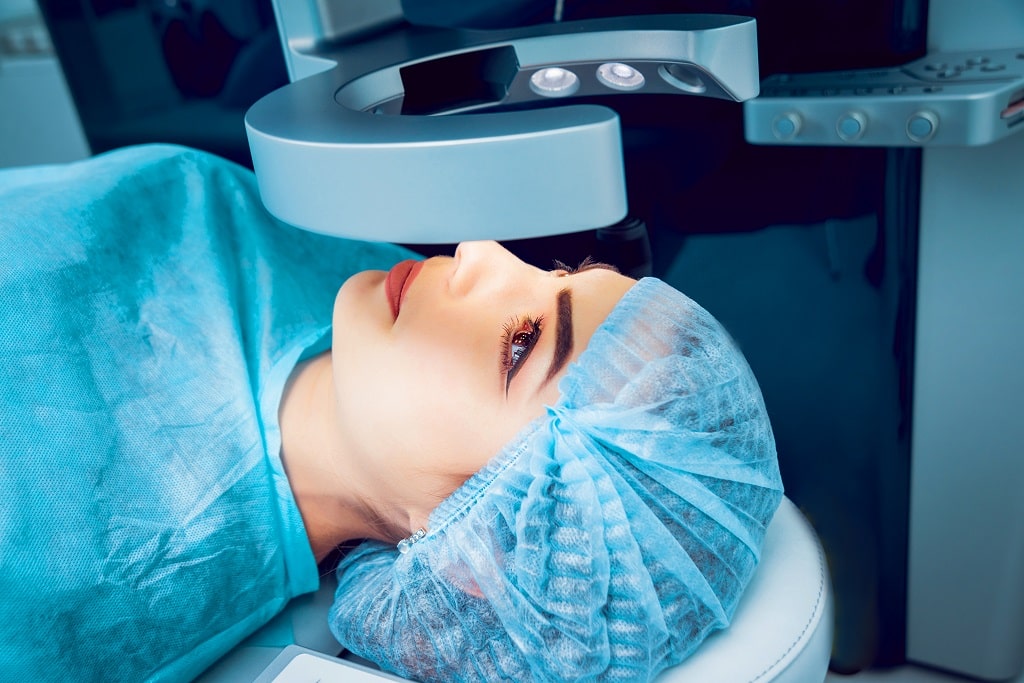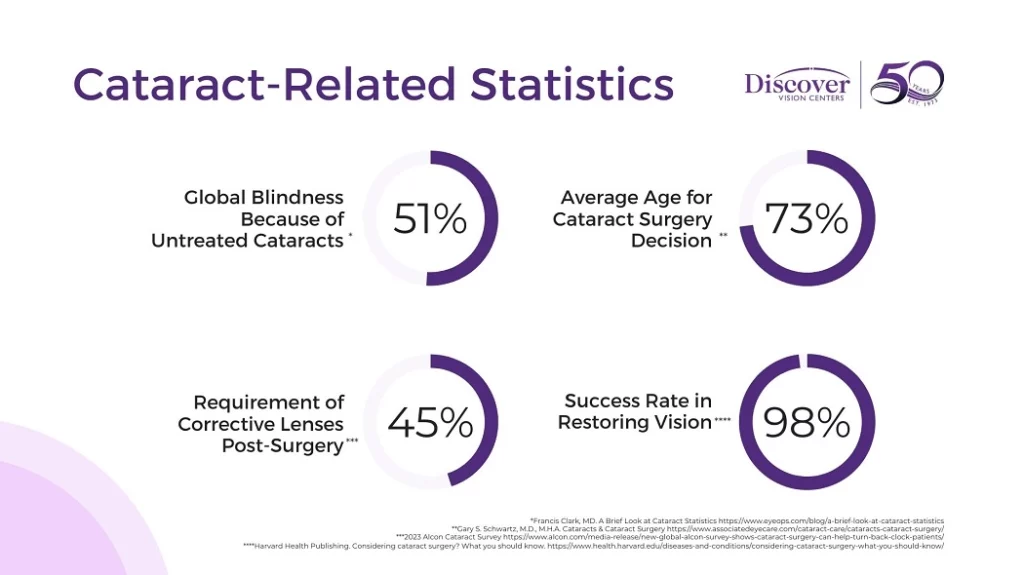
Updated: November 14, 2023

Cataracts are a clouding of the natural lens in the eye, leading to impaired vision and reduced quality of life. As one of the prevalent eye conditions, timely cataract surgery is essential to restore clear vision. But can cataract surgery be postponed?
At Discover Vision, we’re one of the leading cataract correction centers in the Kansas City metropolitan area and Midwest region. Our team is dedicated to providing comprehensive care and ensuring your vision is at its best. Follow along as our team delves deeper into the intricacies of postponing cataract surgery and the critical factors to consider if you find yourself in this position.
Cataracts predominantly result in blurred vision as they cloud the natural eye’s lens. Their progression, however, can vary significantly among individuals. In the early stages, cataract symptoms may be subtle and may not severely impact your vision. Some might even delay cataract surgery, thinking it isn’t required immediately.
Yet, the query, “Can cataracts get worse quickly?” often leads to another pressing question: “What causes fast-growing cataracts?” While most cataracts tend to develop slowly over the years, certain types can indeed progress rapidly, which leads to significant vision impairment within months. Factors including age, diabetes, trauma, exposure to certain medications, and UV light can influence cataract worsening and even contribute to the fast-growing nature of some cataracts. It is important to understand that the type of cataract someone has is not under their direct control. Some people can have fast developing cataracts literally over weeks or months in their 20s and 30’s or it can happen quickly in their 50s to 80’s. Other types of cataracts may take literally decades to bother the patient’s visual function.
As cataracts advance, the need for surgical intervention becomes more pressing. Cataract surgery involves replacing the clouded lens with an artificial lens to restore clear vision. It’s essential to monitor changes in vision and consult an eye doctor (ophthalmologist or optometrist) to understand the rate of cataract progression. Patients need to seek timely intervention and preservation to ensure long-term visual quality.
A cataract is the clouding of the eye’s natural internal lens. Early symptoms can include difficulty with glare from light in day or night settings and blurred vision. As they advance, visual quality will decrease and begin to affect overall visual function. Like many things in our lives, each person can have a different experience as their cataracts progress. Some cataracts will be very slow-growing, while others can have more of a rapid onset. Diabetes, ocular trauma, and some medications including systemic steroids can lead to more rapidly developing cataracts. Each individual will have a different perspective on when the symptoms are affecting their quality of life. When that time comes, your doctor at Discover Vision Centers will be able to discuss your surgical options including the latest lens implant options that have the potential to free you from needing glasses or contact lenses with your cataract surgery.

One of the most common dilemmas faced by most patients with cataracts is deciding the optimal time for surgery. “Is it better to have cataract surgery early, or should one wait?” is a frequent question posed by many. The decision to undergo cataract surgeries early or delay them can have both benefits and risks. Your choice to move forward with cataract surgery depends largely on individual circumstances and the advice of your ophthalmologist. Let’s delve deeper into both sides of the equation to help you make your decision on timing:
Cataract surgery is a crucial decision, and understanding when to move forward with this procedure is pivotal. Several factors can determine the optimal time. Below, we explore them to give clarity if you’re evaluating your cataract surgery options.

Consider whether the clouding caused by untreated cataracts is affecting your professional life. For those in professions requiring sharp vision – such as artists, designers, pilots, or drivers – compromised vision could impede performance and make it necessary to prioritize surgery.
Cataracts can exacerbate other existing vision problems. For instance, if you’ve had night vision issues, cataracts could intensify these challenges and pose risks during tasks like nighttime driving.
An indirect but concerning consequence of cataracts is an increase in accidents. If you find yourself slipping, tripping, or misjudging distances more frequently, it’s a signal that your vision has been significantly compromised. You’ll want to seek intervention.
Your overall health status and other medical conditions play a role in the decision. For some, systemic illnesses might encourage them to postpone surgery, while for others, conditions like diabetes might require earlier intervention to prevent rapid cataract progression.
It’s worth noting that cataracts developing at a younger age could have different trajectories compared to those appearing later in life. The sooner a cataract forms, the more aggressive it may be. This leads some patients to consider earlier surgical intervention.
Different cataract types can have varied progression rates. For instance, posterior subcapsular cataracts, which form on the back surface of the lens, can swiftly interfere with light and rapidly progress leading to significantly reduced vision in a matter of months. Make sure you know the type you have to guide the urgency of your treatment plan.
Deciding when to undergo Intraocular Lens Surgery, Full Focus® vision correction, or any other type of cataract treatment, can be a major life choice, especially as individuals develop cataracts with varying intensities and at different life stages. At Discover Vision Centers, we’re dedicated to simplifying this decision for you. To further assist, we offer an online cataract self-test, a preliminary step to understanding your visual health better.
Based on your results, our expert team is available to guide you with personalized advice. If any concerns arise, or you’re eager to learn more about your eye health, don’t wait to move forward. Connect with us. Let’s work together to ensure your vision remains crisp and vibrant.